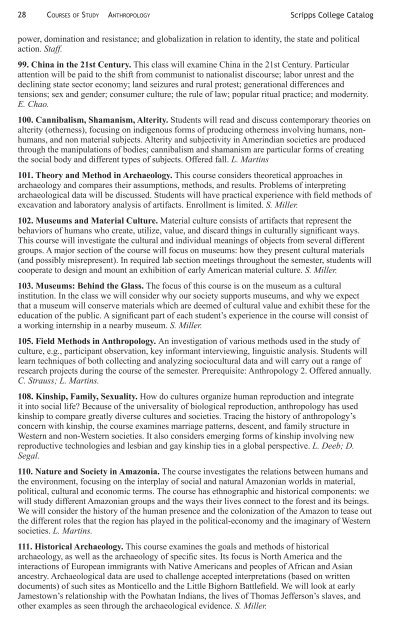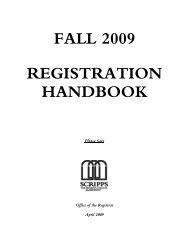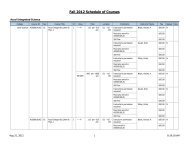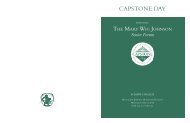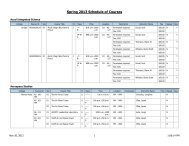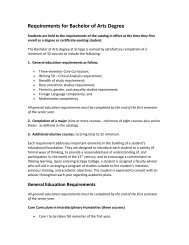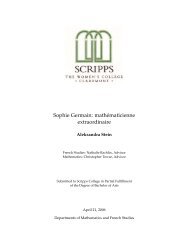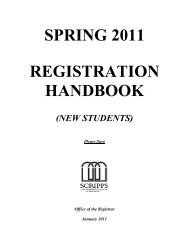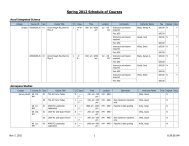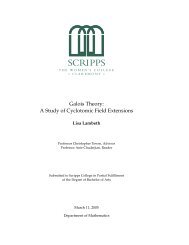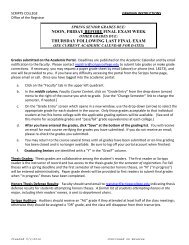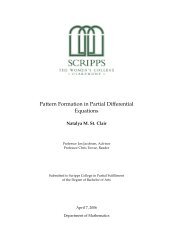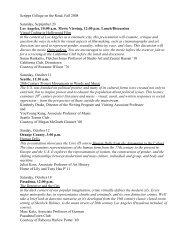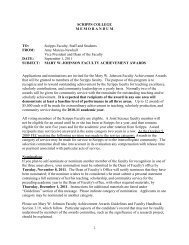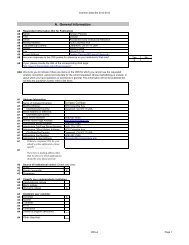PDF of the 2012-2013 Academic Catalog - Scripps College
PDF of the 2012-2013 Academic Catalog - Scripps College
PDF of the 2012-2013 Academic Catalog - Scripps College
Create successful ePaper yourself
Turn your PDF publications into a flip-book with our unique Google optimized e-Paper software.
28 Courses <strong>of</strong> Study Anthropology <strong>Scripps</strong> <strong>College</strong> <strong>Catalog</strong><br />
power, domination and resistance; and globalization in relation to identity, <strong>the</strong> state and political<br />
action. Staff.<br />
99. China in <strong>the</strong> 21st Century. This class will examine China in <strong>the</strong> 21st Century. Particular<br />
attention will be paid to <strong>the</strong> shift from communist to nationalist discourse; labor unrest and <strong>the</strong><br />
declining state sector economy; land seizures and rural protest; generational differences and<br />
tensions; sex and gender; consumer culture; <strong>the</strong> rule <strong>of</strong> law; popular ritual practice; and modernity.<br />
E. Chao.<br />
100. Cannibalism, Shamanism, Alterity. Students will read and discuss contemporary <strong>the</strong>ories on<br />
alterity (o<strong>the</strong>rness), focusing on indigenous forms <strong>of</strong> producing o<strong>the</strong>rness involving humans, nonhumans,<br />
and non material subjects. Alterity and subjectivity in Amerindian societies are produced<br />
through <strong>the</strong> manipulations <strong>of</strong> bodies; cannibalism and shamanism are particular forms <strong>of</strong> creating<br />
<strong>the</strong> social body and different types <strong>of</strong> subjects. Offered fall. L. Martins<br />
101. Theory and Method in Archaeology. This course considers <strong>the</strong>oretical approaches in<br />
archaeology and compares <strong>the</strong>ir assumptions, methods, and results. Problems <strong>of</strong> interpreting<br />
archaeological data will be discussed. Students will have practical experience with field methods <strong>of</strong><br />
excavation and laboratory analysis <strong>of</strong> artifacts. Enrollment is limited. S. Miller.<br />
102. Museums and Material Culture. Material culture consists <strong>of</strong> artifacts that represent <strong>the</strong><br />
behaviors <strong>of</strong> humans who create, utilize, value, and discard things in culturally significant ways.<br />
This course will investigate <strong>the</strong> cultural and individual meanings <strong>of</strong> objects from several different<br />
groups. A major section <strong>of</strong> <strong>the</strong> course will focus on museums: how <strong>the</strong>y present cultural materials<br />
(and possibly misrepresent). In required lab section meetings throughout <strong>the</strong> semester, students will<br />
cooperate to design and mount an exhibition <strong>of</strong> early American material culture. S. Miller.<br />
103. Museums: Behind <strong>the</strong> Glass. The focus <strong>of</strong> this course is on <strong>the</strong> museum as a cultural<br />
institution. In <strong>the</strong> class we will consider why our society supports museums, and why we expect<br />
that a museum will conserve materials which are deemed <strong>of</strong> cultural value and exhibit <strong>the</strong>se for <strong>the</strong><br />
education <strong>of</strong> <strong>the</strong> public. A significant part <strong>of</strong> each student’s experience in <strong>the</strong> course will consist <strong>of</strong><br />
a working internship in a nearby museum. S. Miller.<br />
105. Field Methods in Anthropology. An investigation <strong>of</strong> various methods used in <strong>the</strong> study <strong>of</strong><br />
culture, e.g., participant observation, key informant interviewing, linguistic analysis. Students will<br />
learn techniques <strong>of</strong> both collecting and analyzing sociocultural data and will carry out a range <strong>of</strong><br />
research projects during <strong>the</strong> course <strong>of</strong> <strong>the</strong> semester. Prerequisite: Anthropology 2. Offered annually.<br />
C. Strauss; L. Martins.<br />
108. Kinship, Family, Sexuality. How do cultures organize human reproduction and integrate<br />
it into social life? Because <strong>of</strong> <strong>the</strong> universality <strong>of</strong> biological reproduction, anthropology has used<br />
kinship to compare greatly diverse cultures and societies. Tracing <strong>the</strong> history <strong>of</strong> anthropology’s<br />
concern with kinship, <strong>the</strong> course examines marriage patterns, descent, and family structure in<br />
Western and non-Western societies. It also considers emerging forms <strong>of</strong> kinship involving new<br />
reproductive technologies and lesbian and gay kinship ties in a global perspective. L. Deeb; D.<br />
Segal.<br />
110. Nature and Society in Amazonia. The course investigates <strong>the</strong> relations between humans and<br />
<strong>the</strong> environment, focusing on <strong>the</strong> interplay <strong>of</strong> social and natural Amazonian worlds in material,<br />
political, cultural and economic terms. The course has ethnographic and historical components: we<br />
will study different Amazonian groups and <strong>the</strong> ways <strong>the</strong>ir lives connect to <strong>the</strong> forest and its beings.<br />
We will consider <strong>the</strong> history <strong>of</strong> <strong>the</strong> human presence and <strong>the</strong> colonization <strong>of</strong> <strong>the</strong> Amazon to tease out<br />
<strong>the</strong> different roles that <strong>the</strong> region has played in <strong>the</strong> political-economy and <strong>the</strong> imaginary <strong>of</strong> Western<br />
societies. L. Martins.<br />
111. Historical Archaeology. This course examines <strong>the</strong> goals and methods <strong>of</strong> historical<br />
archaeology, as well as <strong>the</strong> archaeology <strong>of</strong> specific sites. Its focus is North America and <strong>the</strong><br />
interactions <strong>of</strong> European immigrants with Native Americans and peoples <strong>of</strong> African and Asian<br />
ancestry. Archaeological data are used to challenge accepted interpretations (based on written<br />
documents) <strong>of</strong> such sites as Monticello and <strong>the</strong> Little Bighorn Battlefield. We will look at early<br />
Jamestown’s relationship with <strong>the</strong> Powhatan Indians, <strong>the</strong> lives <strong>of</strong> Thomas Jefferson’s slaves, and<br />
o<strong>the</strong>r examples as seen through <strong>the</strong> archaeological evidence. S. Miller.


